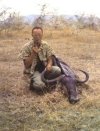CIC HUNTING LAWS AND POLICIES, LATEST NEWS »
MISSED TARGET: DUTCH PROPOSAL FOR GLOBAL BAN ON TROPHY HUNTING – A SHINING EXAMPLE OF DISINFORMATION
2 NOVEMBER 2015
The Dutch Secretary of State for Economic Affairs, Ms. Sharon Dijksma, recently called for an international ban on trophy hunting of, for example, lions and elephants. She informed the Parliament in a letter dated 26th October that she has initiated the investigation on the feasibility of such a global ban. Ms. Dijksma would also look for the United Nations to recognize the poaching and the illegal trade of wildlife as an international crime.
The CIC is of the strong opinion that while the idea of reducing poaching might be well-intended, her proposal is seriously flawed and creates confusion and misunderstanding. First of all, it has not been made clear whether the proposed ban is to be applied to all wild animals, or only to threatened species. Her reference to saving ‘iconic’ animals from extinction is simply a tactic to gain public support, however, lacks any scientific foundation and is simply uncalled for. There is a multitude of non-iconic species that need much more attention.
Secondly, to place legal trophy hunting in the same negative category as poaching and illegal trade of wildlife seems to be an intentional defamation of legal trophy hunting. The United Nations and the CITES Convention are in the forefront to prohibit and fight poaching and illegal trade of wildlife, and hunting organisations are active and efficient allies of the UN and CITES in this battle.
Ms. Dijksma’s statement that agriculture as a land-use option might be a solution to stop poaching is deeply flawed. A major consequence of implementing these intentions would be that primarily developing countries would be denied their right to decide how they want to manage their wildlife populations. Poor rural communities would suffer from loss of necessary income through the utilisation of wildlife and the livelihood of countless rural families would be destroyed. Furthermore, it has been recognized by the International Union for the Conservation of Nature (IUCN – of which the Netherlands is a State Member) and many other organizations involved in nature conservation that if wildlife loses its economic value gained through hunting, animals would destroy crops, possibly kill people, and poaching would even increase, as hunters would have no reason to invest any further in anti-poaching measures. Trade bans cause in Zimbabwe and South Africa increased poaching of elephants and rhinos, because the demand for ivory and rhino horn remains the same.
The CIC advises all politicians to seek balanced and science-based information to gain a deeper understanding of the global implications of such a ban on hunting. The CIC is ready to assist in providing information and expresses its hope that the feasibility study will be prepared with the assistance of IUCN, the recognised, global authority in nature conservation.
Source: www.tweedekamer.nl
MISSED TARGET: DUTCH PROPOSAL FOR GLOBAL BAN ON TROPHY HUNTING – A SHINING EXAMPLE OF DISINFORMATION
2 NOVEMBER 2015
The Dutch Secretary of State for Economic Affairs, Ms. Sharon Dijksma, recently called for an international ban on trophy hunting of, for example, lions and elephants. She informed the Parliament in a letter dated 26th October that she has initiated the investigation on the feasibility of such a global ban. Ms. Dijksma would also look for the United Nations to recognize the poaching and the illegal trade of wildlife as an international crime.
The CIC is of the strong opinion that while the idea of reducing poaching might be well-intended, her proposal is seriously flawed and creates confusion and misunderstanding. First of all, it has not been made clear whether the proposed ban is to be applied to all wild animals, or only to threatened species. Her reference to saving ‘iconic’ animals from extinction is simply a tactic to gain public support, however, lacks any scientific foundation and is simply uncalled for. There is a multitude of non-iconic species that need much more attention.
Secondly, to place legal trophy hunting in the same negative category as poaching and illegal trade of wildlife seems to be an intentional defamation of legal trophy hunting. The United Nations and the CITES Convention are in the forefront to prohibit and fight poaching and illegal trade of wildlife, and hunting organisations are active and efficient allies of the UN and CITES in this battle.
Ms. Dijksma’s statement that agriculture as a land-use option might be a solution to stop poaching is deeply flawed. A major consequence of implementing these intentions would be that primarily developing countries would be denied their right to decide how they want to manage their wildlife populations. Poor rural communities would suffer from loss of necessary income through the utilisation of wildlife and the livelihood of countless rural families would be destroyed. Furthermore, it has been recognized by the International Union for the Conservation of Nature (IUCN – of which the Netherlands is a State Member) and many other organizations involved in nature conservation that if wildlife loses its economic value gained through hunting, animals would destroy crops, possibly kill people, and poaching would even increase, as hunters would have no reason to invest any further in anti-poaching measures. Trade bans cause in Zimbabwe and South Africa increased poaching of elephants and rhinos, because the demand for ivory and rhino horn remains the same.
The CIC advises all politicians to seek balanced and science-based information to gain a deeper understanding of the global implications of such a ban on hunting. The CIC is ready to assist in providing information and expresses its hope that the feasibility study will be prepared with the assistance of IUCN, the recognised, global authority in nature conservation.
Source: www.tweedekamer.nl







